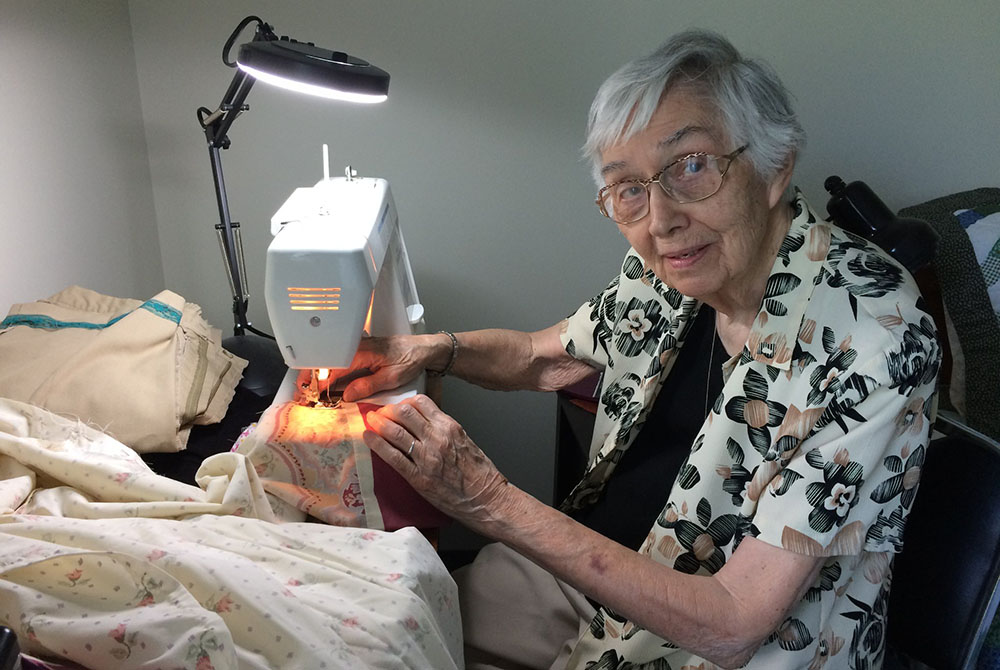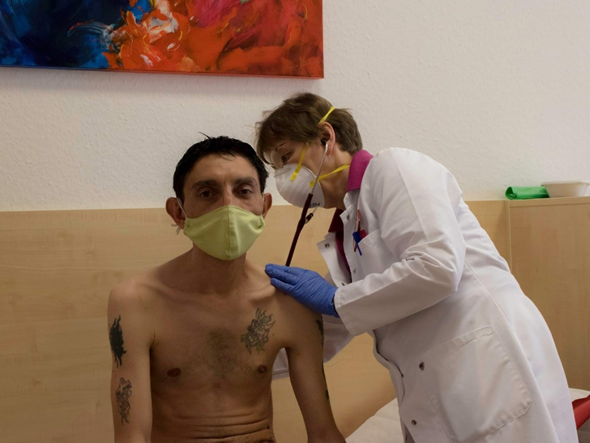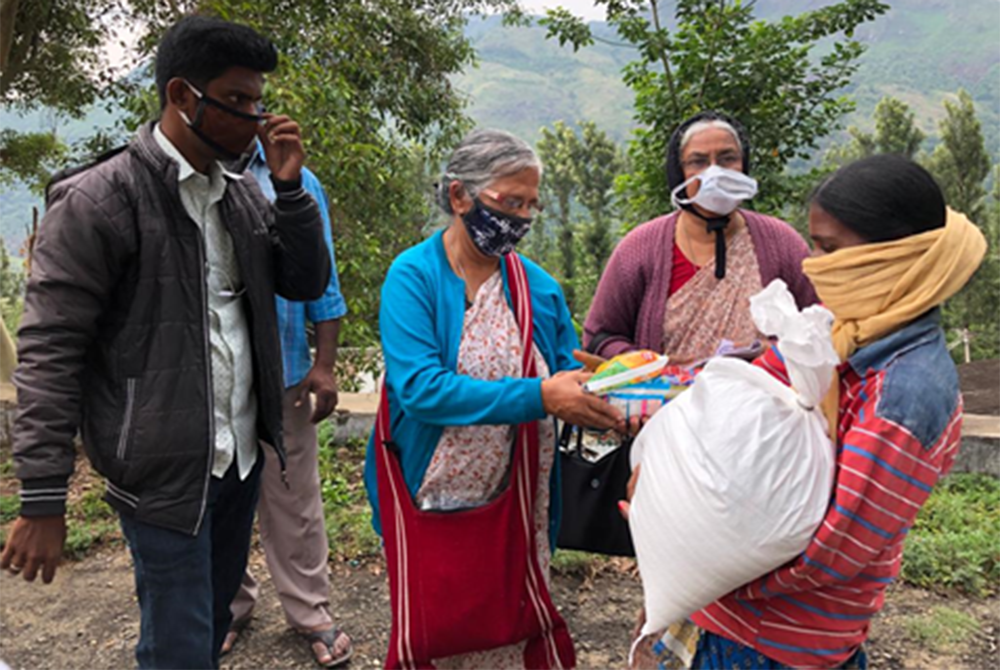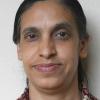
Sr. Jane Gates, MD, the first superior general of the Medical Mission Sisters after its founder. Sister Jane, 93 years old and a former surgeon, finds that her hands are still steady enough to sew gowns for medical care providers during the pandemic. (Eunice Cudzewicz)
Our world has changed tremendously, suddenly come to a standstill as if the electricity has gone off. We hear many people say these days that "we are all in it together." Really?
COVID-19 does not discriminate among Hollywood celebrities, sports stars, politicians, millionaires or the poor. However, the worst hit are the poor and the daily wage earners around the world who do not have the option of working from home. When it comes to care, your survival depends on your ability to stay away from the virus and the thickness of your wallet.
Stay home, stay safe? COVID-19 exposed deep economic inequality. The United Nations Human Rights Office of the High Commissioner reported in a statement that "approximately 1.8 billion people worldwide live in homelessness and grossly inadequate housing," citing Leilani Farha, U.N. special rapporteur on the right to adequate housing.
Peoples of the world are faced with the same wind in the ocean of life but are responding to the pandemic in different boats!
The international media highlighted the untold sufferings of migrant workers who were forced to walk miles and miles across Indian states, hungry and weak — the unforeseen consequence of an unplanned lockdown by the Indian government. The sufferings of the people who were the builders and helpers of a society raises questions for our human conscience: Where is our faith in action?
Many faith-based organizations reached out to them with food and water, but that was only a drop in the ocean. All the religious groups in India, especially the Catholic Church, could do much more. But many religious leaders failed; they closed the churches, and told the faithful to follow the state policies for safety, but they did little to respond to migrant issues. This remains a scar on our collective soul.
I attended a virtual discussion on "Inequality in a Pandemic" with Joseph Stiglitz and Wayne Swan. Stiglitz, a Nobel laureate and economics professor, said that the United States has committed to $2.7 trillion to "recovery measures"; despite that, the most vulnerable have not received the money.
In May, Amfar, the Foundation for AIDS Research announced study results that showed "how disproportionately Black counties in the U.S. are bearing the brunt of the COVID-19 pandemic. … The study clearly showed that COVID-19 diagnoses and deaths increased in counties with a greater proportion of Black residents. While disproportionately Black counties constitute only 22% percent of U.S. counties, they account for 52% and 58% of COVID-19 cases and deaths, respectively."
Gregorio Millett, Amfar's vice president and director of public policy, said study results "prove that county-level data can be used to gauge COVID-19 impact on black communities to inform immediate policy actions."
The unrest and protest following the brutal killing of George Floyd in Minnesota is an outpouring of anger towards and rejection of structural racism and injustice. It still reverberates around the world to this date. Greed and dominance of a few perpetuates injustice, leading to the suffering of humans and the destruction of mother earth.
The United Nations Secretary-General António Guterres tweeted April 6 that "peace is not just the absence of war. Many women under lockdown for #COVID19 face violence where they should be safest: in their own homes."
He appealed for peace in homes around the world. It is disgusting that women and girls had to face violence even under lockdown.
Poverty and famine are showing their ugly heads, mostly in the least developed and middle-income countries. People are already hit hard by climate change, caused by unsustainable consumption and production elsewhere. Rich countries are reminded of the historic ecological debt caused by their exploitation of natural resources from the global south — which calls for a debt cancellation for vulnerable countries unable to support the needs of their people.
But the kingdom of God is here, too. The pandemic also exposes the best side of humanity, as we hear in story after story. The lockdown has given busy parents an opportunity for more time with their children, and for children to learn from their parents. The sharing spirit in each one gets an opportunity besides deepening bonds. There have never been so many Zoom calls and telephone connections, both for education and entertainment. People are singing from different cities and countries around the world. Some find more time to reflect and pray.

Sr. Maria Goetzens, director of the Elisabeth-Strassambulanz Outpatient Clinic, works with Caritas in a hospital that offers medical help for homeless people in Frankfurt, Germany. (Courtesy of The Elisabeth-Strassambulanz Outpatient Clinic)
We see goodness everywhere — individuals helping other individuals; institutions and companies reaching out to families and communities. Grocery shops and postal services are continuing their work, as neighborhoods serve neighbors in need. Health care professionals risk their own lives to serve others, with the community appreciating them with claps and candles. Nature has become a sacred place for experiencing the mysteries of God — refreshing and renewing the body and soul. The earth community became alive and intimate to those who relate to it closely. The better world is already here; as Jesus said, the kingdom of God is among us.
Let me share some examples from our Medical Mission Sisters around the world. The sisters are involved in the battle against COVID-19: taking preventative measures, treating the sick, feeding the hungry, and housing the homeless. We are not the only ones distributing food and health equipment in the neighborhoods, but we also provide counseling and offer prayers.
Through hospitals in Ethiopia, Ghana, India, and south London, or the center in Frankfurt, Germany, several Medical Mission Sisters are at the forefront responding to COVID-19 patients.

Medical Mission Sisters in Kodaikanal, India, where they support over 200 families with food supplies. (Gracy K.)
In Kodaikanal, India, we support over 200 families with food supplies. Many Medical Mission Sisters are fully involved in helping the most vulnerable around the world.
Hope for Southall Street Homeless is a charity that runs a night shelter for the homeless in London. In this project Indian Sr. Jyoti Kujur works as a complex needs case worker, keeping contact by phone or traveling to the hotels once or twice a week, supporting clients in their various needs.
The stories go on — our sisters are involved in a variety of ways in all 18 countries where we serve, and of course other religious are doing their best too.
It is necessary to be in the forefront responding to the immediate needs, but addressing systemic injustice is vital in order to move toward a social solidarity economy. Considering the deep social and economic impact of COVID-19, leaders need to collaborate and prepare for a fairer world, after COVID-19.
The pandemic is one of the worst global crises so far in our lifetime that calls for a united global response. Though the political leaders have failed in some areas, it is encouraging to see the global efforts for a vaccine. Hopefully they make sure that no one will be left behind in accessing it. The world can learn many lessons from COVID-19: For me, the loudest message is that we are so much interconnected, and no one is safe until all are safe.
We are all facing the uncertainty and it is not at all a comfortable place to be. Is there a shortcut other than to see this crisis as an opportunity? This worst pandemic is the best time for political and religious leaders to show their leadership and their humaneness. We human beings are blessed with the divine spark within us to know what is right and to do good. The cry of the Earth and cry of the poor must be answered with compassion and global solidarity. God is the author of life and nature, and we need to be grateful for the gift of life by serving others.
The words of our founder Dr. Anna Dengel give me hope: "Be optimistic, no matter what comes, we don't have to be afraid; we are in God's hands." Mother Earth shows us how to live with resilience, telling us that this too shall pass. The good news is that hope is alive amidst chaos, because God will never give up on creation.
[Celine Paramundayil represented the Medical Mission Sisters, an international nongovernmental organization at the United Nations, for the last 10 years. With her grassroots experience and expertise, she was active at the U.N., advocating for people in poverty and the planet. After completing her term at the U.N. this July, she has held off her return to India, due to the pandemic.]
Advertisement





